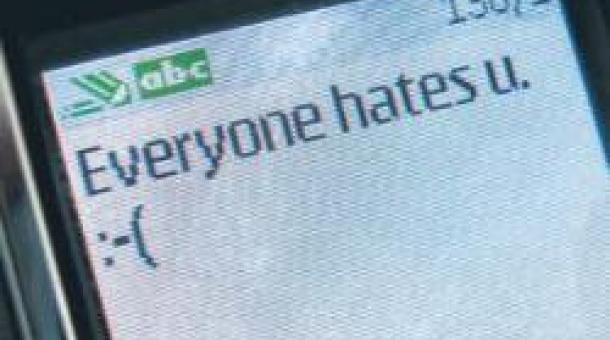Leigh was in eighth grade when the mean messages started. The emails, texts, and posts got worse. It was so bad that she eventually changed schools.
Leigh says she has come through the experience more self-aware and compassionate toward others. It was a terrible time, she says, but with some counseling and support from adults and friends, she was able to make sense of what happened to her.
Most people know about cyberbullying. Here are some suggestions on what to do if you, or someone you know, is involved.
What Counts as Cyberbullying?
Cyberbullying is the use of technology to harass, threaten, embarrass, or target another person. Online threats, rude texts, and mean tweets, posts, or messages all count. So does posting personal information or videos designed to hurt or embarrass someone else.
Cyberbullying also includes photos, messages, or pages that don't get taken down, even after the person has been asked to do so. In other words, it's anything that gets posted online and is deliberately intended to hurt.
In some situations, cyberbullying is considered harassment.Intimidation or mean comments that focus on things like a person's gender, religion, sexual orientation, race, or physical differences fall into this category. Whether it's done in person or online, this type of meanness counts as discrimination and is against the law in many states. That means law enforcement could get involved, and bullies may face serious penalties.
Some schools or other organizations might make a distinction between bullying and harassment. That's because of legal differences and definitions. But to the person being harassed or bullied, there's no real difference — it's painful to go through, no matter what you call it.
Online bullying can be particularly damaging and upsetting because it's usually anonymous or hard to trace. People can be tormented on a 24/7 basis — anytime they check their phone or computer. Sometimes, they might not know what's being said behind their backs or where the meanness is coming from.
Online bullying and harassment can be easier to commit than other acts of bullying because the bully doesn't have to confront his or her target in person.
Virtual Acts, Real Consequences
Because of the role technology plays in our lives, there is often no place to hide from bullies. Online bullying can happen at home, school, or anywhere else people go online.
Sometimes, online bullying, like other kinds of bullying, can leave people at risk for serious problems: Stress from being in a constant state of upset or fear can lead to problems with mood, energy level, sleep, and appetite. It also can make someone feel jumpy, anxious, or sad. If someone is already depressed or anxious, cyberbullying can make things much worse.
It's not just the person being bullied who gets hurt. The punishment for cyberbullies can be serious. More and more schools and after-school programs are creating systems to respond to cyberbullying. Schools may kick bullies off sports teams or suspend them from school. Some types of cyberbullying may violate school codes or even break anti-discrimination or sexual harassment laws, so a bully may face serious legal trouble.
Why Do People Do It?
Why would someone be a cyberbully? There are probably as many reasons as there are bullies themselves.
Sometimes, what seems like online harassment may be accidental. The impersonal nature of text messages, posts, and other ways of communicating online means it can be hard to figure out if someone is joking or not.
Most people know when they're being bullied, though, because bullying involves relentless insults or threats. The people doing the bullying know they've crossed a line too. It's not a one-off joke or insult — it's constant harassment and threats.
Virtual Acts, Real Consequences
Because of the role technology plays in our lives, there is often no place to hide from bullies. Online bullying can happen at home, school, or anywhere else people go online.
Sometimes, online bullying, like other kinds of bullying, can leave people at risk for serious problems: Stress from being in a constant state of upset or fear can lead to problems with mood, energy level, sleep, and appetite. It also can make someone feel jumpy, anxious, or sad. If someone is already depressed or anxious, cyberbullying can make things much worse.
It's not just the person being bullied who gets hurt. The punishment for cyberbullies can be serious. More and more schools and after-school programs are creating systems to respond to cyberbullying. Schools may kick bullies off sports teams or suspend them from school. Some types of cyberbullying may violate school codes or even break anti-discrimination or sexual harassment laws, so a bully may face serious legal trouble.
Why Do People Do It?
Why would someone be a cyberbully? There are probably as many reasons as there are bullies themselves.
Sometimes, what seems like online harassment may be accidental. The impersonal nature of text messages, posts, and other ways of communicating online means it can be hard to figure out if someone is joking or not.
Most people know when they're being bullied, though, because bullying involves relentless insults or threats. The people doing the bullying know they've crossed a line too. It's not a one-off joke or insult — it's constant harassment and threats.
If a Friend Is a Bully
If you know of a friend who is acting as a cyberbully, take him or her aside and talk about it. Without putting your friend down, stand up for your own principles: Let the bully know it's not OK.
Explain to your friend that bullying can have very serious consequences: for the bully, for the person (or people) being bullied, and even for bystanders like you and your friends. Meanness is like pollution — it can spread to bystanders who may get stressed out or upset about what's going on. Do what you can to build a bully-free environment!

No comments:
Post a Comment